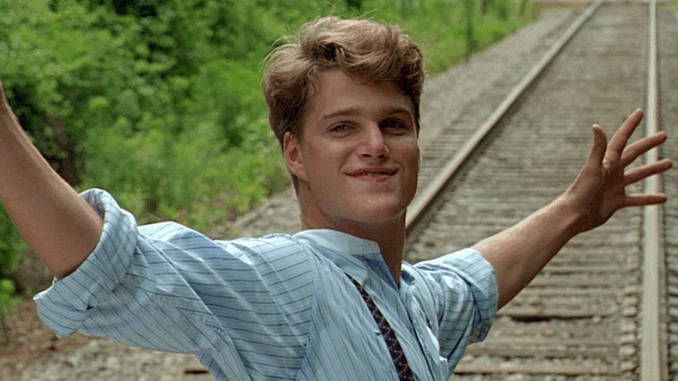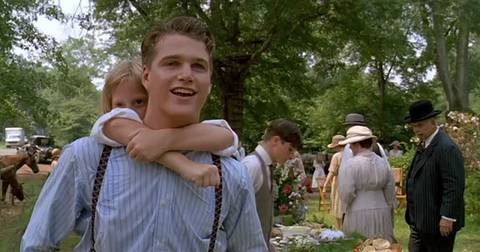
A Brief Spark with Lasting Impact
Though Buddy Threadgoode appears only briefly in Fried Green Tomatoes, his presence is unforgettable, like a flash of lightning that leaves the air charged long after it’s gone. He is Idgie’s older brother—the golden boy of Whistle Stop—charming, kind-hearted, and full of mischief. Buddy isn’t just a character; he’s a symbol of innocence, progressiveness, and the bright future that could have been.
From the moment we meet him, Buddy stands apart from the rigid Southern norms of his time. He’s openly affectionate with Idgie, protective of Ruth, and unafraid to speak against injustice. In a community mired in conservative values, Buddy is different—unapologetically kind, inclusive, and open-minded. He represents a new kind of Southern masculinity, one that values emotional connection over dominance.
His Death and the Collapse of a Dream
Buddy’s sudden death is one of the film’s most traumatic moments. He’s struck by a train while chasing after Ruth’s dropped hat—an act of spontaneous chivalry that tragically ends his life. But Buddy’s death does more than sadden the audience; it fractures the world of those around him. For Idgie, it’s the moment she begins to retreat from society, shielding herself from future pain. For Ruth, it’s the loss of a protector. For the town, it’s the fading of a light that promised hope and change.
Buddy’s absence becomes a haunting presence throughout the story. His loss is not just a family tragedy; it’s symbolic of lost potential and thwarted progress. Had he lived, one could imagine Buddy pushing against the societal limitations of race, gender, and sexuality that Whistle Stop—and the South—so deeply enforced. He might have grown into a man who challenged the town’s norms, supported Idgie’s defiance, and even stood up publicly for Big George and Sipsey.
A Queer Reading of Buddy Threadgoode

Some viewers and scholars have speculated that Buddy might have been gay or bisexual—a reading encouraged by his tender affection for Ruth and his easy emotional intimacy with others. While the film never confirms this, the ambiguity invites interpretation. In many ways, Buddy embodies the kind of man who does not perform toxic masculinity; he’s gentle, emotionally available, and unafraid to be vulnerable. His progressive nature—especially in contrast to men like Frank Bennett—makes him feel like a character decades ahead of his time.
His potential queerness, if accepted, makes his death even more poignant. It adds another layer to the story of lost possibility, particularly for LGBTQ+ viewers who rarely saw such characters represented with kindness and depth in early 20th-century Southern settings. Buddy becomes a symbol not only of what the South could have been, but also of the lives that were lost or silenced due to societal repression.
The Catalyst for Idgie’s Rebellion
Buddy’s death doesn’t just mark the end of innocence—it catalyzes Idgie’s transformation. The wild, unkempt young girl we see later in the film is shaped by grief. She turns away from polite society and embraces a life on the margins, one defined by freedom, mischief, and a quiet resistance to convention. In many ways, Buddy’s spirit lives on through her.
His encouragement of Idgie’s boldness and his belief in her individuality form the foundation of her later strength. Even in death, Buddy remains her moral compass. When Idgie stands up to Frank Bennett, runs the café with Ruth, and protects Big George, she does so with a courage that echoes Buddy’s example. He becomes the silent mentor behind every act of rebellion.
Remembering Buddy—A Legacy Etched in Memory
Although Buddy dies young, his legacy is profound. The characters remember him not with sorrow, but with warmth. His memory brings laughter, nostalgia, and sometimes tears—but never bitterness. This emotional resonance speaks to his significance not just as a character, but as a symbol.
In a narrative filled with strong women, racial injustice, and Southern tradition, Buddy stands out as a rare male figure who supports rather than dominates. He loves without control, speaks without cruelty, and believes in others without condition. Through him, the film subtly critiques the typical models of masculinity and presents an alternative—one rooted in kindness, curiosity, and respect.
His brief appearance and untimely death serve as a reminder of life’s fragility, but also of how a single soul, even in passing, can change the course of many lives. Buddy Threadgoode may have lived only a short while in Whistle Stop, but his light continues to shine through the people who loved him—and through every viewer who recognizes the quiet heroism in his smile.
